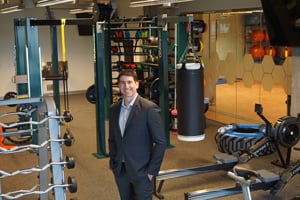Kinema Fitness of West Los Angeles is rapidly growing its mini-empire of corporate gyms and wellness programs across the country, adding its newest prize in August: the future home of Google Inc.’s Chicago office.
Kinema founder and President Joshua Love has come a long way since starting his career in the fitness industry six years ago as a personal trainer.
Love then began offering corporate wellness programs, consisting of exercise classes, personal training and educational workshops for hotels and companies. But his firm really took off a few years ago when he started managing gyms in commercial office buildings, such as Windy City developer Sterling Bay’s 1KFulton building, which will soon house Google.
The tactic introduced him to even more corporate wellness clients.
“Revenue has doubled each year since we started,” said Love.
There’s been an explosion in corporate wellness programs over the last 10 years, said LuAnn Heinen, vice president of the National Business Group on Health, a Washington, D.C., nonprofit advocating for large employers on national health policy issues. The programs, meant to increase workers’ health, include a variety of approaches such as workplace fitness classes, healthier cafeteria menus, standing desks and incentives to quit smoking.
“Ninety percent of (Fortune 500) companies are doing something significant in wellness,” said Heinen, who noted that the movement was sparked by employers’ concerns about rising medical costs, which are most keenly felt by larger self-insured companies.
Research firm IBISWorld recently pegged the U.S. corporate wellness services market at $7 billion.
The national economy has also improved, loosening up discretionary income, said Daryoush Aflatooni, founder of West Hollywood work-site wellness provider Omployer, which teaches Zumba, yoga and mindfulness classes everywhere from factories to law firms.
“It’s also a very good item for recruiting new employees,” Aflatooni added.
But the linchpin for Kinema – managing commercial building gyms – has succeeded because tenants occupying high-rises have grown accustomed to sophisticated exercise options at major health clubs.
“If you’re in this high-rise building and all you have is five treadmills, five ellipticals and a couple free weights, you’re not going to get people to use it,” said Pamela Kufahl, the Overland Park, Kan.-based director of content and engagement at fitness trade website Club Industry. “If you really want it to be a true amenity, you need to put in more time and effort.”
President in training
After a stint as an IBM consultant, Love realized his true passion was working out and helping people. He received certification as a personal trainer and got a job in 2007 at Santa Monica gym Equinox Fitness.
A few years later, one of Love’s regular clients, who worked at the Viceroy Hotel in Santa Monica, asked the trainer’s advice on improving the luxury hotel’s gym. Soon, he was teaching beach boot-camp classes to its guests and employees. L’Ermitage in Beverly Hills and other luxury resorts became clients not long after, he said.
Love hired freelance instructors and expanded the business with corporate clients such as AOL Inc.’s Beverly Hills office and Lost Hills’ Paramount Farms, which had an on-site gym but couldn’t entice workers to use it, he said.
“We need to be more than this,” Love said he realized at the time about his business.
So he developed marketing materials to educate employees and offered stretching sessions in a factory setting to create exposure for the fitness center.
Love rebranded as Kinema in 2011, growing his client roster and expanding core offerings beyond classes and private sessions. Those offerings included workshops on nutrition and physical fitness that helped employees take simple steps to improve their lives, such as reducing sugar intake.
After one such workshop at the AT&T Center in downtown Los Angeles, it dawned on Love to ask the building’s management, LBA Realty, if Kinema could oversee the high-rise’s 26,000-square-foot athletic club.
“There are 27 companies inside that one building,” Love said. “If you can manage that fitness center, it automatically gives you leverage to build relationships with the 27 other companies.”
What also made it appealing, said Love, is that gym managers don’t pay rent or own the equipment, which keeps overhead costs low.
After some research, Love discovered many commercial properties charge building tenants to use their gyms but tend to operate at a loss with little management and low tenant engagement.
However, Irvine-based LBA didn’t give Kinema the AT&T Center contract right away. Instead, the real estate firm had Love pitch a program for the Towers in Emeryville, another one of its office complexes.
When Kinema doubled the gym’s membership after two months through part-time programming and a major renovation, LBA finally gave the firm the AT&T Center. Love brought in a general manager, full-time staff, personal trainers and scheduled 20 classes a week.
Kinema now manages six commercial fitness centers in Los Angeles, San Francisco and Chicago to go along with its 11 corporate wellness clients and 25 hotels for which it develops fitness programs.
While its wellness programs cost corporate clients about $50,000 a year on average, Love said the gyms typically generate between $10,000 and $20,000 a month in gross revenue. Kinema takes a management fee for handling staffing, programming, billing and equipment maintenance, though Love declined to say how much.
Heidi Reid, LBA’s senior property manager at the AT&T Center, said Kinema’s services are comparable in quality to those at brand-name gyms but still affordable. Combined with its ability to engage tenants and increase membership and revenue, Kinema has an edge over other fitness management firms.
“When there’s more tenant participation,” she said, “They feel like they’re getting better value.”

